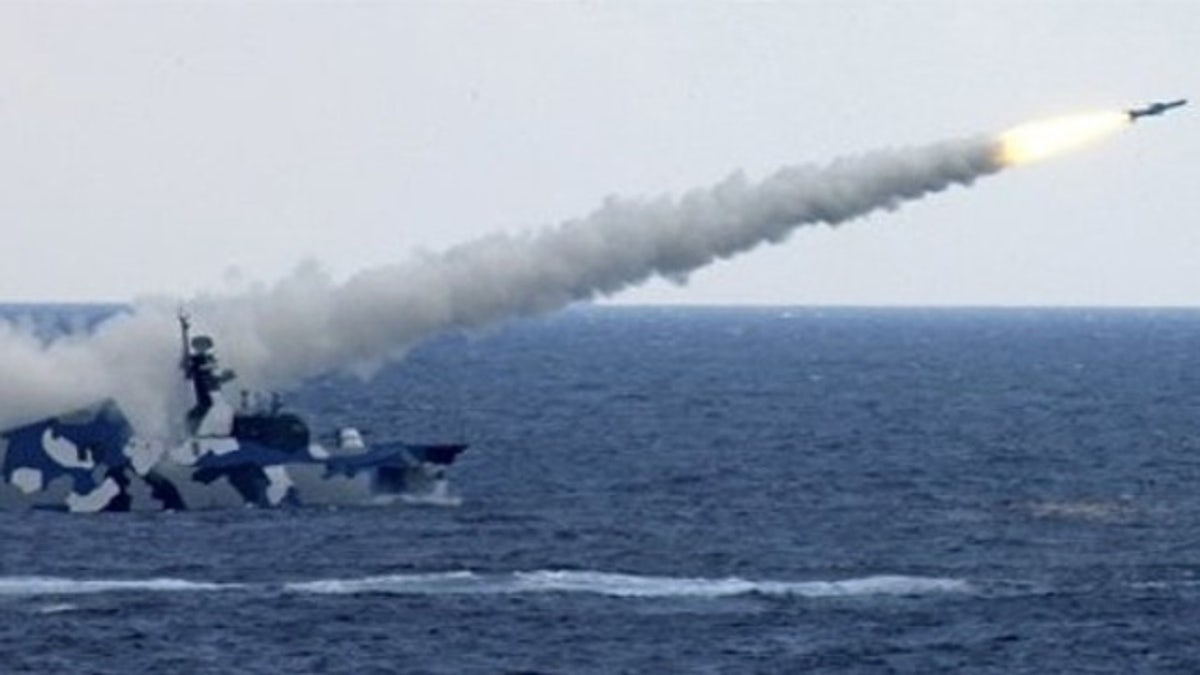
A People's Liberation Army (PLA) warship launches a missile during a live-ammunition military drill in this photo released on Thursday, July 29, 2010 by China's Xinhua News Agency. This most recent test remains shrouded in secrecy. (AP)
China remains silent following fresh tests of long-range missiles that experts say pose a growing threat.
On Wednesday, U.S. officials verified the covert flight trials, the Washington Times reported, which took place Sept. 25; in the tests, the Chinese military launched a missile from its Taiyuan missile center to Korla, a western Chinese city 1,800 miles away.
U.S. officials were made aware of the impending tests on Sept. 23, when the Chinese government issued a "notice to airmen" alerting aircraft to avoid the airspace between the two towns.
Though the Chinese government has yet to comment, reports from websites within China indicate the test most likely involved a second missile: an "interceptor" with a restricted flight range. These sites speculate that there were launches from two locations, one an interceptor missile instructed to take out the first, long-range test missile shot from from Taiyuan.
Chinese Embassy spokesman Wang Baodong told the Times that he was not aware of the test, but stated that if it took place, China's military "poses no threat to any other countries, and serves for peace and stability in the region and in the world at large."
China's silence isn't completely expected. The country made an official announcement following similar testing in January. While some think the country is hiding a failed test with their silence, experts believe that the Asian superpower simply doesn't want to flaunt its growing might.
Beijing's growing military threat is no secret as it continues to develop its weapons arsenal, including an unprecedented new missile designed to be launched from land with enough accuracy to penetrate the defenses of even the most advanced moving aircraft carrier from a distance of more than 900 miles, sources say. The latest test may indicate some new functionality of that weapon.
Navy Adm. Robert Willard, head of U.S. Pacific Command, told Tokyo media in August that the Chinese antiship weapon "has undergone repeated tests and it is probably very close to being operational."
Initial reports on the new missile suggest it could reshape conflicts at sea, but U.S. weapons experts told FoxNews.com in August that it's neither a game-changer, nor a revolutionary threat to America's aircraft carriers -- which are the center of U.S. Pacific defense strategy.
"Some have called it a game-changer. I would dispute that claim," said Toshi Yoshihara, an associate professor at the U.S. Naval War College.
When complete, the Dong Feng 21D -- a version of which was displayed last year in a Chinese military parade -- could give China the ability to reach and hit U.S. aircraft carriers well before the U.S. can get close enough to the mainland to hit back.
FoxNews.com's SciTech section is on Twitter! Follow us @fxnscitech








































